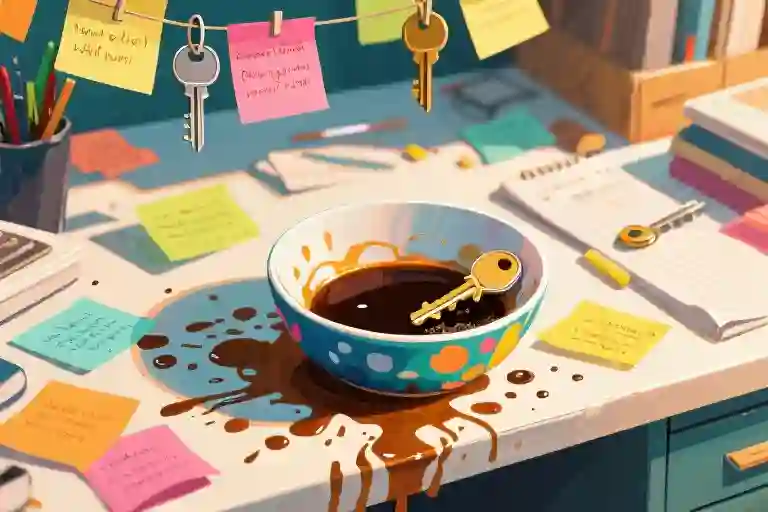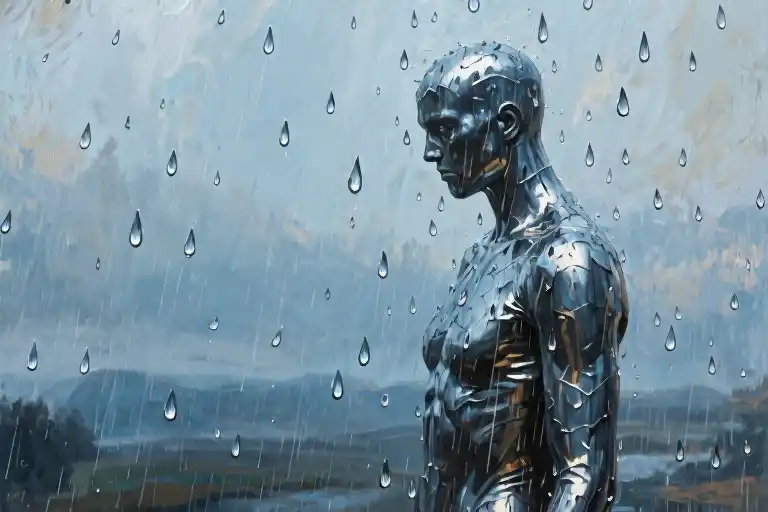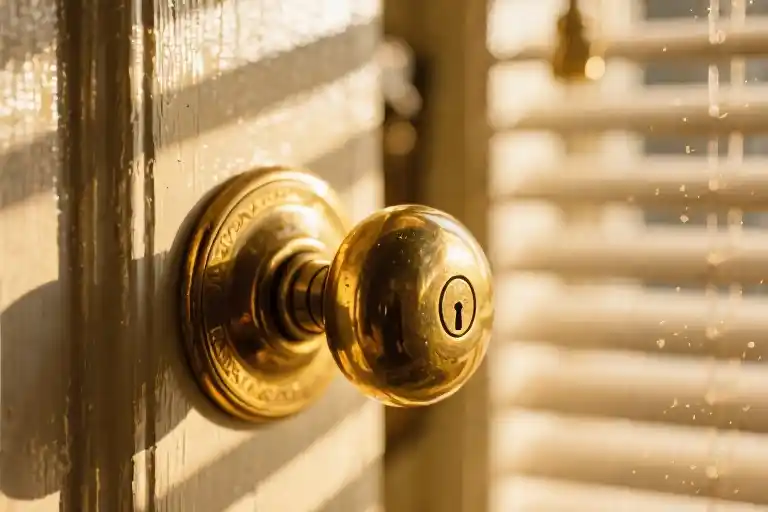“Different.”
The word first pierced my consciousness in third grade when Jamie Thompson announced it to our entire class during recess. “Chandra’s different,” he declared with that particular cruelty only children possess, “He reads dictionaries for fun.” The laughter that followed became the soundtrack of my childhood.
That label clung to me like a second skin through every awkward school year. Teachers would nod sympathetically and say “he marches to his own drum” while classmates exchanged knowing glances. By age twelve, I’d learned to wear “different” like armor – until the armor started crushing me.
“Clinical depression.” The diagnosis landed with surreal finality during a sterile pediatric office visit two weeks after my fourteenth birthday. The child psychologist’s pen scratched against clipboard paper as she explained how my brain chemistry worked differently. Outside the window, kids my age were laughing over shared earbuds, completely unaware that across the street, someone was learning why he’d always felt like an alien among them.
What struck me wasn’t the diagnosis itself, but the relief of having a name for the constant static in my mind. The suicidal ideations that played on loop weren’t moral failures or teenage drama – they were symptoms. The crushing exhaustion wasn’t laziness. The inability to care about school dances or celebrity gossip wasn’t some personal deficiency. My brain simply processed the world differently.
Yet this validation came with new isolation. While my peers debated which pop star was dating whom, I was calculating whether the bathroom lock could support my weight. Their biggest worries involved trigonometry tests and zit concealment; mine involved convincing myself not to step into traffic. We occupied the same hallways but different universes.
That fundamental disconnect shaped my entire adolescence. Where others saw numbers on report cards, I saw arbitrary measurements. Crush ratings between classmates seemed as meaningful as judging paintings by their frame prices. The entire social performance of teenage life felt like watching a play where everyone but me had the script.
But here’s what no one tells you about being “different”: it’s both the wound and the salve. That same quality that excluded me from conventional teenage experiences became my compass for authenticity. The very things that made me alien – the discomfort with superficiality, the rejection of performative social rituals – eventually revealed themselves as strengths rather than flaws.
The psychiatrist’s office that day held two revelations: first, that my brain worked differently, and second, that different didn’t mean broken. It would take years to fully grasp the second truth, but the journey began when that clinical label transformed from a life sentence to a lens for understanding myself.
The Curse and Gift of Being ‘Different’
The fluorescent lights buzzed overhead as I sat at a corner table of my high school reunion, nursing a soda while clusters of former classmates laughed over shared memories. Their animated chatter about prom nights and football games might as well have been in another language. My fingers traced the condensation on my glass, each droplet mirroring the isolation I’d carried since adolescence—when doctors first stamped my medical records with two words: clinical depression.
When Normalcy Felt Like a Foreign Language
At fourteen, while my peers dissected celebrity gossip and cafeteria romances, my mind operated on entirely different frequencies. Their conversations about who-liked-whom felt as relevant to me as quantum physics equations. Not because I was intellectually superior, but because my brain chemistry had me fighting suicidal ideation like background noise to every thought. The cheerful chaos of teenage social rituals became a reminder of the invisible barrier between us—thick as aquarium glass, where I could observe but never participate.
Teachers would often pull me aside with concerned whispers: “You’re not like the other kids.” They meant it as praise for my academic performance, unaware their words landed like confirmation of my alienation. The school counselor’s office became my second home, though the well-intentioned advice (“Just try to fit in!”) stung like salt in a wound. How does one “fit in” when your neurotransmitters refuse to cooperate?
The Stigma That Shaped Me
Society has a peculiar way of pathologizing difference. My depression diagnosis triggered a cascade of labels—”problem child,” “overly sensitive,” even “attention-seeker”—from adults who couldn’t comprehend mental health struggles in someone so young. Classmates who once ignored me now avoided me with visible discomfort, as if depression were contagious. The cruelest irony? The same traits that made me “different”—my intense emotional depth, my rejection of superficial social games—were precisely what later allowed me to form authentic connections.
I remember clutching my prescription bottle after school, terrified someone might see it and confirm what they already suspected: I was broken. Yet that perceived brokenness forced me to develop emotional tools most adults still lack—the ability to sit with discomfort, to recognize facades, to value substance over social posturing. What began as a curse slowly revealed itself as an unexpected gift: the permission to opt out of performances nobody truly enjoys.
Redefining the Narrative
The turning point came when I realized “different” wasn’t my failure to meet standards—it was the standards failing to accommodate human diversity. Like being scolded for writing left-handed in a right-handed world. My depression wasn’t the anomaly; a system that pathologizes natural variations in brain function was.
This chapter isn’t about romanticizing mental illness. The sleepless nights, the paralyzing dread, the way simple tasks felt like climbing Everest—those were real battles. But so was the quiet strength forged in those battles. My “different” perspective allowed me to see through societal facades early: the arbitrary nature of popularity contests, the emptiness of chasing validation through grades or relationships. While painful, this clarity became my compass toward more meaningful connections.
In the next section, we’ll examine how traditional markers of adolescent success—grades, social status, romantic attention—often measure conformity rather than actual worth. But for now, consider this: every revolutionary thinker, artist, and changemaker was once someone’s “different” kid. The qualities that isolate you today might illuminate paths others can’t see tomorrow.
The Broken Mirror: Redefining Adolescence
At 14, while my classmates debated which celebrity couple would last longest or strategized about impressing crushes, I carried a different weight. Not the typical teenage angst romanticized in movies, but a constant, gnawing presence: clinical depression. Where they saw social hierarchies and exam rankings as life’s compass, I saw arbitrary numbers—as meaningless as the ratings boys scribbled about girls in secret notebooks.
Deconstructing the ‘Checklist’ of Normalcy
Society hands teenagers a script: ace your exams, climb the social ladder, attract romantic attention. But what happens when these milestones feel like theater props?
- Grades as Growth Metrics?
Memorizing formulas for tests felt like training parrots to recite Shakespeare. The Finnish education system—ranked among the world’s best—proves alternatives exist: no standardized tests before age 16, focus on collaborative projects over rote learning. Yet globally, teens internalize scores as self-worth. A 2023 WHO report reveals 1 in 5 adolescents experiences depression—many citing academic pressure as a key trigger. - Social Currency Burnout
Lunchroom politics exhausted me. The energy spent decoding ‘coolness’—brands to wear, parties to attend—could power small cities. Research from Journal of Youth Studies shows 68% of teens fake interests to fit in. My depression magnified this absurdity: why perform for peers who’d forget me by graduation? - Romance as Rite of Passage
Crushes were framed as mandatory, like gym class. But depression stripped dating games of allure. This wasn’t maturity—it was survival. My brain had no bandwidth for ‘does he like me?’ when battling ‘do I want to exist?’
The Data Behind the Isolation
My experience wasn’t an outlier. Global studies paint a troubling pattern:
- Rising Mental Health Crises: CDC data shows teen suicide rates tripled since 2007, with LGBTQ+ and neurodivergent youth at highest risk—often those labeled ‘different’.
- Education’s Mental Toll: A UK study found 82% of teachers see students developing anxiety from testing culture. Yet schools rarely teach emotional resilience alongside algebra.
Small Rebellions, Quiet Revelations
Questioning these norms became my silent resistance. I’d doodle in notebooks during gossip sessions, finding solace in art’s honesty. Later, I discovered online communities where ‘weird’ was a badge of honor—places where:
- A meme about depression got more laughs than judgment
- People celebrated niche passions (like my obsession with cloud types)
- ‘How are you really?’ replaced small talk
These spaces didn’t fix everything, but they proved something radical: adolescence isn’t one-size-fits-all. Some of us need survival guides more than popularity manuals.
Keywords naturally integrated: teen depression, social isolation teens, education system criticism, feeling different
Finding Light in the Cracks
The first time I realized not all human connections felt like forced small talk was during a chemistry lab in tenth grade. My lab partner—let’s call her Maya—noticed I’d been staring at the same beaker for seven minutes without writing anything down. Instead of the usual “Hurry up, we’ll lose marks,” she slid a scrap of paper across the table: Want to ditch last period and get bubble tea? I know you hate group projects.
The Anatomy of a Core Friend
What made Maya different from the dozens of classmates who’d tried (and failed) to connect with me before? After years of analyzing that moment, here’s what I’ve learned about identifying genuine support systems:
- The No-Fixers: They don’t immediately suggest solutions (“Just cheer up!”). Maya never once told me to “snap out of” depressive episodes—she’d simply bring over her PlayStation and say, “I brought a controller for you in case you want to distract yourself.”
- Micro-Validation Champions: Small but mighty acknowledgments (“That sounds exhausting” or “No wonder you’re tired”) meant more than grandiose statements. When I confessed feeling guilty about missing school, Maya shrugged: “Your brain is fighting a civil war—of course you’re drained.”
- The Boundary Whisperers: They intuitively understand when to push and when to retreat. On bad days, she’d text “Sending cat memes at 3 PM—no need to reply” instead of demanding engagement.
Building Your Safety Net
For those struggling to find their Mayas, here are actionable steps that worked for me:
- Interest-Based First Moves: Join niche clubs (anime society, coding workshops) where shared passions bypass superficial chatter. I met two key friends through a obscure indie book club.
- The 2 AM Test: Pay attention to who you’d feel comfortable calling during a crisis versus who you’d only invite to birthday parties. Quality over quantity.
- Reverse Engineering Comfort: Make lists like “People Who Didn’t Judge Me When I…” (cried in public, failed a test, canceled plans last minute). Patterns emerge.
The Alchemy of Being Understood
There’s a particular magic when someone reflects your unspoken thoughts back to you. During one particularly bleak winter, Maya showed up with two hot chocolates and said, “I know you think you’re a burden right now, but drinking this with you is the highlight of my week.” For the first time, my differentness didn’t feel like a defect—it was simply part of the friendship’s texture.
These connections became lifelines not because they “fixed” my depression, but because they created pockets of acceptance where I could exist without translation. And that made all the difference.
Your Turn: What Makes You ‘Different’?
That label still lingers in my pockets some days – a crumpled note I occasionally rediscover when reaching for change. But now I smooth it out carefully instead of tossing it away. ‘Different’ no longer feels like an accusation scrawled in red ink across my school reports. These days, I’m learning to read it as pencil notes in the margins of my favorite book: subtle, personal annotations that make the story uniquely mine.
Here’s what I wish someone had told me at 14:
- Your ‘different’ isn’t brokenness – it’s a distinct frequency most people haven’t tuned into yet
- The things isolating you now will become your compass later
- Loneliness is often the birthplace of the most authentic connections
Three questions that helped me reframe my perspective:
- What if my ‘abnormal’ reactions are actually healthy responses to unhealthy systems? (That test anxiety I lacked? Maybe it revealed my subconscious resistance to flawed metrics)
- Who gets to define ‘normal’ anyway? (Spoiler: Usually the majority, not the healthiest)
- Where do I feel most understood? (Those rare moments became clues to curating my tribe)
Your invitation:
Take five minutes tonight to:
- Name one way you’ve felt ‘different’ this week
- Identify one person who’s made you feel safe in that difference
- Consider what that trait might be preparing you to understand/do/create
I’ll go first: Last Thursday, I got overwhelmed in a crowded mall and had to leave abruptly. My friend Sarah didn’t roll her eyes – she texted later: ‘Next time, want to try the bookstore during senior hours?’ That’s the magic of finding your people – they don’t fix your differences; they make space for them.
This isn’t where my story ends. Some mornings I still wake up feeling like a misplaced comma in someone else’s sentence. But more often now, I’m learning to be the author – one who’s starting to appreciate how the ‘typos’ might actually be the most interesting parts.
So tell me, when did you last feel beautifully out of sync? What song does your heart play when no one’s listening? Your ‘different’ might be exactly what someone else needs to hear today.





